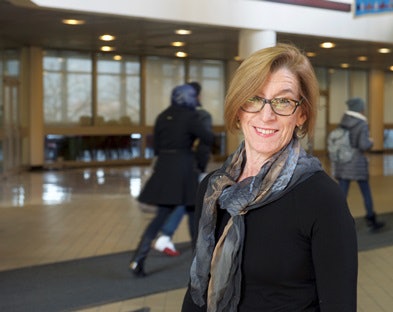 Dr. Lisa H. Rose
Dr. Lisa H. RoseA professor at the Borough of Manhattan Community College is researching how contact with the criminal justice system affects career options, with an eye toward increasing access, specifically in the human services arena.
Dr. Lisa H. Rose, an associate professor and program coordinator of human services at the Borough of Manhattan Community College (BMCC), says that she finds teaching in a community college fascinating given the incredible diversity of the students. In the two decades that she has worked full time in academia, her research has mostly centered on community college students.
“Each time I advise a student and meet with a student individually or talk with students in the classroom, I’m thinking about what their experiences are and how that helps or hinders them in the college experience,” says Rose, who worked as a social worker for 15 years before coming to BMCC.
Different issues come to the surface. One semester, it was homelessness, as a number of the students in a course were homeless and struggling to come to class. Another time, several students were victims of domestic violence. Recently, Rose had three students in one class who had faced contact with the criminal justice system.
“There were problems with getting them internships, roadblocks we hadn’t anticipated,” she says.
The issue seemed extremely salient, as many formerly incarcerated students appear to have gravitated to careers in human services, especially social work.
The human services program is designed to prepare students for careers that focus on helping people solve problems and live more satisfying lives. Rose began exploring the research and found there was very little on community college students who have been incarcerated and the obstacles they face and virtually nothing specific to human services and social work.
She completed a literature review and conceptual paper for the Community College Journal of Research and Practice that was published about a year ago. Since this past September, she’s been engaged in a qualitative study interviewing human services students at BMCC about their experiences.
“With this project, it’s not just a pathway to college and completing college, but it’s also thinking about how the world of work and employers are understanding people who are formerly incarcerated,” says Rose. “One of the trickiest things in particular in human services is that our students have to do a two-semester internship.”
In many cases, internship agencies require background checks and fingerprints. Rose says that it can be frustrating to help these students find an internship as some areas will be precluded by regulation and other agencies are simply not welcoming. Others, such as substance abuse programs or prisoner reentry agencies, will be extremely receptive.
If they pass the internship hurdle, there is still the issue of licensing. One student Rose interviewed for her study articulated great anxiety over the process.
“It’s nebulous, not really clear whether or not students who have had contact with the criminal justice system can be licensed,” Rose says. “It could depend on the kind of crime. I’m concerned about students who have been convicted of violent crimes.”
Rose is hoping to conduct presentations for the National Association of Social Workers and state chapters to learn more about the complex facts—both definite regulations as well as biases.
“I do think there are a lot of preconceived notions about these students and their recidivism and whether they pose a risk in the field with vulnerable populations,” says Rose. “Some people in social work say, ‘Our concern is the populations we serve.’ Others, like me, are concerned with the students that we train and giving them as much support as they need.”
Things Rose sees as essential are that everyone in academia—registrar, financial aid, admissions, etc.—should have some training on this issue. She believes that administrators need to create safe spaces where people can self-disclose and learn when it’s appropriate to disclose either in classes or when applying for internships.
“We, in human services, need to make sure that we aggressively identify agencies that will serve as internships for them and help educate the agencies and the communities about the strengths these students bring to their work,” Rose says.
“For example, these students have a huge capacity for empathy that many of our other students don’t have. Empathy is one of the tools that social workers use.
“Another is their capacity to be nonjudgmental, which is also a tool and one of the ethical foundations of the profession.”
Rose’s goal is to help students figure out what steps to take to pursue careers in human services. She is analyzing her data and envisioning a larger scope of research and advocacy. Going forward, Rose hopes to collaborate with faculty at other community colleges.
“This is the beginning of a much larger piece of research and advocacy effort than I had thought when I first started,” says Rose. “I’m in the process of analyzing the data. This is a qualitative study that I’ve been conducting of students who have had contact with the criminal justice system—lengthy interviews with them.”
“The next step is I want to expand that piece of the research,” she adds. “I want to collaborate with other community college faculty, and I also need to begin to talk more to the agency supervisors and agency administrators and do some interviews with them to find out what their concerns are. I will perhaps begin working with others to write some grants so we can get money to create a more organized response.”















